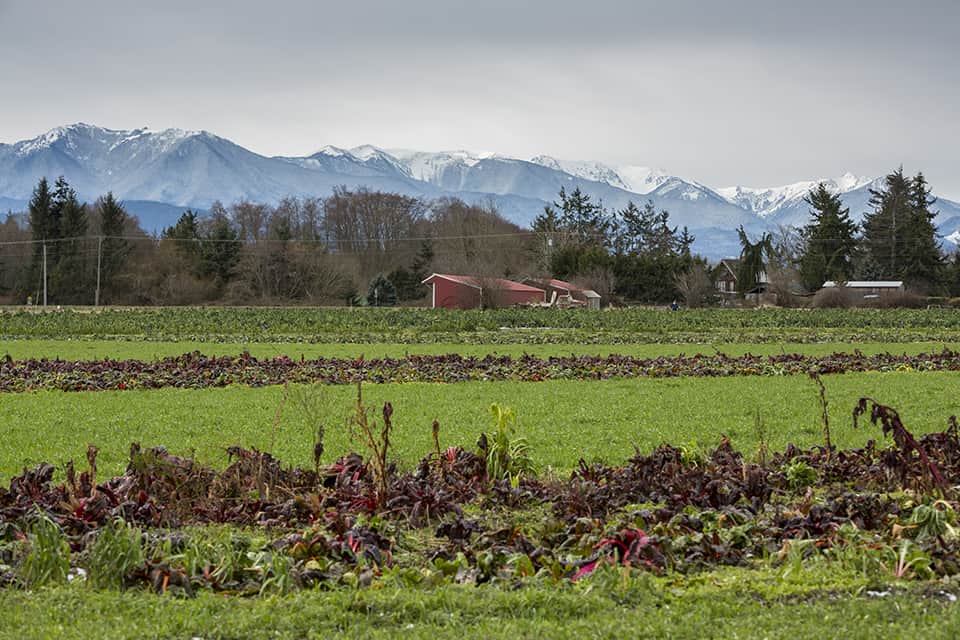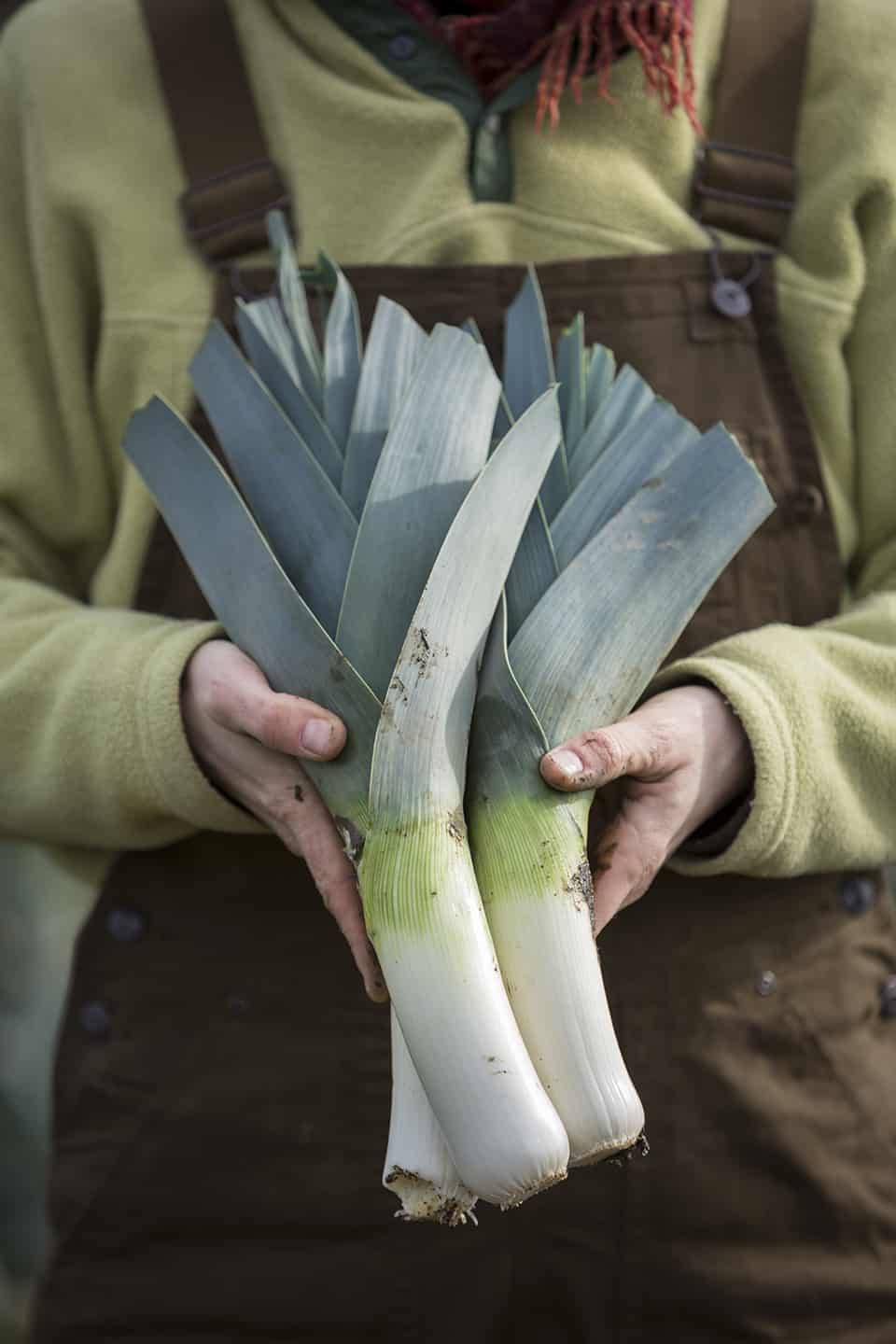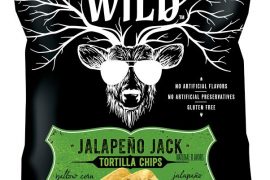The under-appreciated Washington leek
written by Corrine Whiting photography by Tegra Stone Nuess
When we first connected with Kia Armstrong, manager at Nash’s Organic Produce, she was dreaming up dishes for an upcoming crew meal. At Nash’s home in Washington’s fertile Sequim-Dungeness Valley, they serve “farm lunch” for the team the last Friday of every month.
Among Armstrong’s favorite leek-centric creations—a hummus puree that features the farm’s dried field peas with roasted leeks, and a cornbread made using Nash’s freshly ground cornmeal and leeks. (Inspiration for the cornbread comes from Sid Maroney, a farm employee from Tennessee, where cornbread remains unadulterated by wheat flour or sweeteners.) “I love to cook and am passionate about feeding large groups of people and sharing simple recipes that utilize seasonal ingredients,” Armstrong said.
Armstrong, who has worked at Nash’s for fifteen years in roles ranging from harvest crew to booths at Seattle farmers markets, loves leeks. “I can’t have enough in my fridge,” she said. Luckily for her, she has access to them August through May, thanks to the region’s microclimate and the farm’s season extension techniques. “Overwintered leeks are sown in the field in tightly knit rows in late April and then transplanted into beds about eight weeks later,” Armstrong said. “They are ready to harvest in November, and we peck away at them through May.”


Washington leeks can be a gourmet ingredient
Jason Stoneburner, executive chef at Seattle’s Bastille Café & Bar and Stoneburner, has an affinity for leeks, too. “[The leek is] humble and inexpensive and extremely versatile,” he said. “You’re able to change its flavor profile and texture by different techniques, similar to what you can do with meat.” Stoneburner’s favorite way to prepare leeks? “I make big batches of a leek condiment in the summer to spoon over grilled meat, cheese, toast and fish,” he said. In order to use fresh leeks throughout the year, Stoneburner sources from several farms, most of them—like Nash’s—based at Seattle’s Ballard Farmers Market.
Over the years, Nash’s Organic Produce has won awards from many local organizations on the Olympic Peninsula, in addition to receiving state and national accolades. Situated on the fertile delta of the Dungeness River, Nash’s is surrounded by water on three sides and the majestic Olympic Mountains to the south. The North Olympic Peninsula boasts a unique, moderate climate and “amazing alluvial soil” that enables Nash Huber and his team to produce “the finest organic fruits, vegetables, grains, seed, eggs and pork year-round.”
Armstrong said that, among the farm’s “wonderful-tasting, fresh food,” carrots stand out. Huber has been planting his own carrot seeds for decades; these days, the farm grows 9 acres of carrots annually (over seven rotations). She praised the farm’s Brussels sprouts, too. The farm sells its goods at seven local markets, through CSA programs and wholesale to PCC Natural Markets (Seattle), Organically Grown Company (Portland) and Discovery Organics (Victoria, B.C.).
Although Huber and his wife, Patty McManus-Huber, own 19 acres of land, their team farms more than 600 acres and has nine landlords. The land includes 70 acres of vegetables, berries and orchard; 355 acres of grain; 30 acres of organic seed; 40 acres devoted to pigs, poultry and compost; 40 acres in wildlife habitat and buffers, and the remainder hay or fallow. The farm employs about thirty-two people (two-thirds of them full-time).
The couple pushes for seasonal extension for several reasons—since people have to eat all year long and so the farm can offer year-round employment. “It takes many years to train a good farmer,” Armstrong said, explaining the farm strives to retain staff for multiple years. “We grow a lot of winter crops to be harvested fresh from the fields twelve months a year. It’s rough work picking Brussels sprouts or kale in the rain and cold, but it keeps folks employed.”
Huber has also worked hard over the past forty years to expand the farm’s footprint and to retain the agricultural landscape of Sequim. With so much pressure on the development of farmland, he attempts to keep as much of it in production as possible. The farm’s seed-breeding work also plays into season extension, as it develops varieties suited to the Pacific Northwest climate.
Washington organic produce lovers
Loyal Nash followers love visiting the farm store, which is open six days a week (and daily from May through October). The shop features more than eighty items on any given day, with items ranging from local cider and craft beer to cheese and meat, as well as an extensive all-organic produce department. Shoppers notice a strong emphasis on education and access to recipes, plus a kids’ corner and lending library.
“It’s a great place for folks to come get perspective on what’s going on here,” Armstrong said. “They get a sense of place, as they have to drive right by the fields to get to the store, which was intentionally placed in the heart of the operation.”







